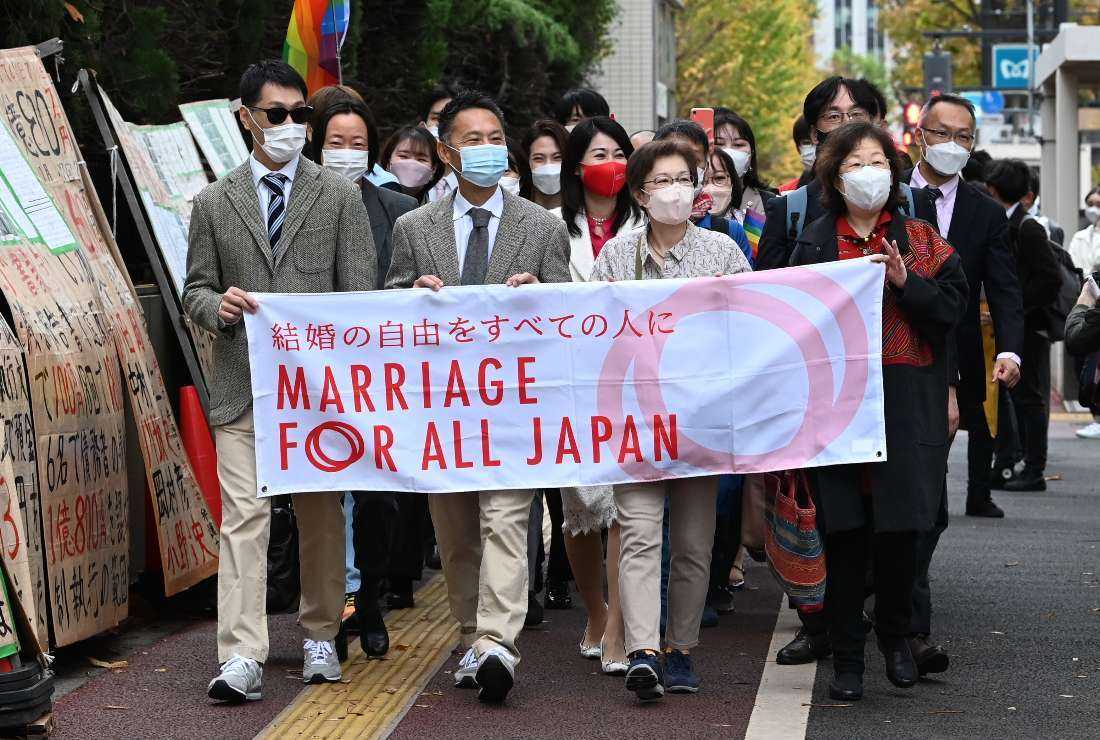
Just because a majority of its lawmakers reject gay marriage doesn’t mean the nation is bigoted or ultra-conservative

Plaintiffs and their supporters head to the Tokyo District Court in Tokyo on Nov. 30, 2022, in a lawsuit filed by same-sex couples seeking damages from the government arguing the ban on same-sex marriage is unconstitutional. (Photo: AFP)
Japanese Prime Minister Fumio Kishida recently stated that the country's ban on same-sex marriage is not discriminatory, as constitutional freedom of marriage only envisions heterosexual unions.
The comment has, as expected, triggered criticism from the left in parliament, with many questioning whether Kishida is backpedaling to show consideration for ultra-conservatives in his party who oppose sexual diversity.
But is it really an ultra-conservative view to oppose same-sex marriages?
This stance is primarily rooted in the philosophy at the core of the Japanese ethos, which is Confucian at heart. But often, especially foreigners, when reflecting on Japanese culture and values confuse Confucian ethics with Shinto, which doesn’t hold a set of moral absolutes and only assesses the positives or negatives of action according to the context.
Confucianism on the contrary is a true ethical guide for living. It's a philosophical and ethical system that originated in ancient China and has had a significant influence on Japanese society throughout its history.
Some of the key precepts of Confucianism that are still relevant in Japanese society today include the respect for hierarchy and authority, as Confucianism places a great emphasis on respecting authority figures which, in east Asian cultures, is seen as absolutely necessary in maintaining social order.
"When the international community condemns Japan for being bigoted or ultra-conservative in its views, it is missing the point"
In Japan, this is reflected in the importance placed on age, rank, and seniority in various social contexts. As a matter of fact, the Japanese have embedded in their very language a system of honorific speech to distinguish age and rank.
One strong component of Confucianism is filial piety. That is it places great importance on the family and the duty of children to respect and care for their parents. In Japan, this translates into a strong emphasis on familial obligations and the importance of maintaining close family ties despite often the upshots of the modern economy — which wants people concentrated in large urban areas — diluting this once-strong bond.
Harmony and social order are for Confucianism the highest goals. That is why in Japan the strong emphasis on group harmony and the value placed on consensus-building and cooperation in various social contexts is celebrated as a typical Japanese stereotype.
In this philosophy, everyone in society has a role, and diversity in this context means that different roles apply in society. This notion is what truly collides with the more modern conception of "diversity," which often refers to gender identity and minority groups.
These are concepts too new for the traditional ethos of the country, and it is no surprise that the very idea that a family can be composed of two same-sex partners is insoluble with its basic centuries-old values.
So when the international community condemns Japan for being bigoted or ultra-conservative in its views, it is missing the point. The reluctance of accepting an alternative family type does not come from a narrow-minded or prejudiced mindset, but from the very roots that articulate a different set of norms and values.
Imagine if the first Catholic missionaries who arrived in Japan, while trying to convince the peasants who were used to their traditional thousands of ‘kami’ (deities) that there was only one God, quickly made up their minds that the Japanese were just bigots or way too conservative, and therefore instead of making logical and rational efforts to persuade them — as they did — would’ve just tried to force them straight into baptism?
"It is in no way fair to dismiss an entire culture or belief system as bigoted or dogmatic simply because it differs from one's own"
And let’s remember that the Western values brought to Japan back then were very different from what they are now.
By this logic, any ethics or beliefs that haven’t changed in the past 20 years should be branded as bigoted or even dogmatic.
Therefore to claim discrimination against lesbian, gay, bisexual, transgender, and queer (LGBTQ) people because a majority of lawmakers in Japan do not believe in gay marriage cannot be in any way taken as a serious argument.
As the LGBTQ community moves along with its own stated goal to claim respect for differences, it should act accordingly and respect a different set of social values. It is important to recognize that cultural differences and the evolution of values occur over time. Therefore it is in no way fair to dismiss an entire culture or belief system as bigoted or dogmatic simply because it differs from one's own.
However, as if nothing else matters, gender minority activists are now already urging the government to enact what they call "anti-discrimination legislation" before Japan hosts a summit of the Group of Seven (G7) industrialized nations in May in Hiroshima.
*The views expressed in this article are those of the author and do not necessarily reflect the official editorial position of UCA News.
Help us keep UCA News independent
The Church in Asia needs objective and independent journalism to speak the truth about the Church and the state.
With a network of professionally qualified journalists and editors across Asia, UCA News is just about meeting that need. But professionalism does not come cheap. We depend on you, our readers, to help maintain our independence and seek that truth.
A small donation of US$2 a month would make a big difference in our quest to achieve our goal.

Share your comments